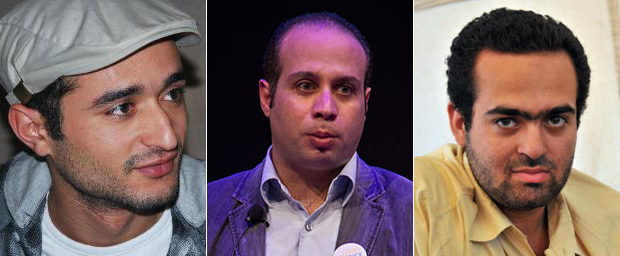Index relies entirely on the support of donors and readers to do its work.
Help us keep amplifying censored voices today.

Leading bloggers Ahmed Douma, Ahmed Maher and Mohammed Adel are among those who are currently in prison
Earlier this month, two police officers were sentenced to ten years for the torture and manslaughter of blogger, Khaled Said. But this ruling does not mark change for Egypt’s political system. Instead, it is a token gesture set against a catalogue of abuse.
Three years on from the revolution, Egypt seems tired of turmoil and apathy is mounting. The youth movement, April 6, made the decision to boycott the recent referendum and the idea spread. Although the country’s younger generation makes up a quarter of the population, only a tiny minority turned up to vote. Their absence meant the new constitution was approved by more than 98%.
However political activist, Salma Said believes this low attendance was down to a different issue. “The youth didn’t participate because the youth are in jail”, she said via Twitter.
Her comment highlights the alarming increase of politically motivated arrests. There is a clear targeting of bloggers, journalists and activists. In Egypt, the price for dissent is high.
Leading bloggers Ahmed Douma, Ahmed Maher and Mohammed Adel are among those who are currently in prison. Sentenced to three years with hard labour and a fine of EGP 50,000, they were arrested for their defiance of a new law restricting protest.
Yet it seems their real crime is their criticism of authority, paired with online influence – collectively they have nearly 4 million followers on Twitter. In prison, the injustices continue. Earlier this month, they complained of being beaten by guards, which is not the first time they have suffered mistreatment in jail.
Their arrests are part of a crackdown on dissent – their imprisonment is an attempted gagging.
At the beginning of the year, Alaa Abdel Fattah became another high profile blogger to be arrested, along with his sister Mona Seif. Accused of torching the campaign headquarters of a former presidential candidate, the pair firmly protested their innocence but each received one year suspended sentence.
Mona Seif is vocal in her consistent criticism of the SCAF, the Egyptian military’s governing body. She works to expose the SCAF’s targeted arrests of protestors and their mistreatment of detainees. An ongoing part of her project involves asking those who have been released to record their experience and to document any injuries suffered in jail.
While Seif was released, Fattah was not. More accusations were brought against him, this time of inciting protest – a charge for which he spent 115 days behind bars without trial. He was eventually released late last month and is now awaiting trial on April 6. He showed his resolve on Twitter: “We will continue….”
Again, Fattah’s arrest seems to be punishment for his activity online. In 2005, he won the ‘Reporters without Borders’ prize for his hugely popular blog ‘Manalaa’, gaining international attention. He was one of the leading faces in 2011’s revolution and he is still a firm advocate of free expression.
The crackdown on government critics and pro-democracy campaigners has shaken Egypt’s internet generation, leaving them with a feeling of powerlessness. In a letter dated December 24, Alaa Abdel Fattah wrote to his sisters: “What adds to my frustration is that this imprisonment has no value. This is no struggle and there is no revolution”.
Award winning blogger, Sandmonkey shares Fattah’s beaten attitude in a post where he addresses the country’s older generations: “Our depression stems from our knowledge that you will not fix anything.”
As mainstream media returns to its pre-revolution ways by siding with the government, it seems the blogger’s role is more important than ever. Independent voices must be heard. But support is fading for revolutionaries as newspaper headlines and editorials brand them “anarchists” and “thugs”.
Many Egyptians seem happy to sacrifice certain freedoms for stability. With liberal commentators being squeezed out of political discourse and into prison, the public begin to believe that an authoritarian state is the only alternative to Islamic extremism.
For years, Egypt’s bloggers have been subject to savage beatings, intimidation and even sexual assault at the hands of the police. Today, it seems that little progress has been made despite the revolution. With many figures of hope in jail or exile, the future seems bleak. Fattah believes it’s as if they’ve waged “war on a whole generation.” But Egypt’s youth must not give up the fight.
This article was published on 4 April 2014 at indexoncensorship.org
Two journalists were shot by security services, and another detained whilst covering the political unrest in Egypt over the weekend. Mahmoud al-Ghazali, Nile TV correspondent, was shot with pellets early on Saturday morning, whilst reporting on clashes between protesters and security forces. Al-Ghazali was shot in the eye, causing extensive damage. Online journalist Salma Said was shot around 1am on Monday by security forces while she filmed clashes in central Cairo. The journalist was hit in the face, legs and stomach. Mohamed Rabee from independent newspaper Al-Badil was forcibly detained by plain clothed officers yesterday, as he dictated a news story to his colleague via mobile phone.